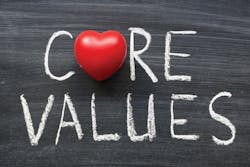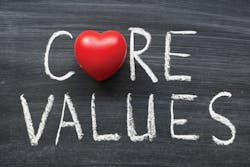Core values: Although difficult to establish, the values reflect the essence of a dental office
By Dorothy Garlough, RDH, MPA
Values are a beacon of light in any office, offering guidance when the going gets tough and decisions need to be made. In a wholearchy, or a republic of team, they are especially important, setting the principles by which team members operate as individuals and as a whole. The values of a person-centered team will represent what the organization is all about and link the daily procedures to the overall mission of the office. Values need to be identified and aligned in order to achieve a holistic team.
Values are the cornerstones and essence of any organization, and dental offices are no exception. They are the principles, beliefs, or philosophy that the office holds as their standards of operating.1 They give meaning to the work that we do and, in the end, is what is most satisfying to us.
Ultimately, all organizations are made up of humans who wish and deserve to be treated as citizens within organizations. The wholearchical office provides the opportunity to have its members work as productive individuals and be respected. This gives meaning and purpose to all members of a team.
The mindful leader of a person-centered team will create a ripple effect by caring for himself or herself and others, treating everyone as equals. The result is that employees feel valued. This generates engagement and leads to a compassionate work environment and a culture that is professional, progressive, and inclusive. These core values will need to be what the team buys into. They cannot be dictated or installed and each team member will need to be predisposed to the values in order to adopt them.
Psychologists Duane Brown and Kelly Crace say, "Values are widely viewed as central to the selection of, and subsequent satisfaction with life roles . . . Values are representations of needs that, when developed, provide standards for behavior and orient people to desired end states."2
What does this mean? It means that we will behave, strive, and be happy when we feel that we are in alignment with values (i.e., what we feel to be important). What is your desired end state? Are you most interested in patient care because of integrity, or is empathy your driver? Is one of your values fairness? If so, it might irk you at a deep level if there is favoritism being shown by the doctor to another staff member. If one of your values is creativity, it might propel you to take a risk to leave an office that is stuck in the same routine and is not open to new ideas.
Core values tell us what is right and wrong. They spotlight behavior and action. Team values will let us know if we are on the right path and are the guidance system to help us reach our vision and purpose. As I mentioned earlier, the office's values are the essence of its identity.1 They offer the office a competitive advantage, because patients can see what is important to you in all that you do. They want to know if what you are about is in alignment with their values. A wholearchy team member will examine regularly if they are authentically aligned with what you promise to deliver.
In addition to giving meaning, core values are the underlying competencies that keep the office running smoothly. Having them helps with decision making by looking at the decision and seeing if it aligns with one of your values.4 For example, if the office holds respect for patients, and you have a patient who has shown up 20 minutes late for his 40 minute appointment, your office might have the policy to reschedule. This will show respect for the next scheduled patients.
Most companies struggle to find their core values because it is not a simple task. Business leader Jim Collins says that values need to be discovered; they cannot be randomly chosen with the hope that the office will adapt to them. They are not activities or even "best practices"; they are the reason behind what the office does. They are fundamental and you would believe in them even if you inherited a fortune and were able to retire. Values endure. Values do not radically change.
So, what are some values? Experts have identified over 250 positive values, but there are a few values common in wholearchies:
- Quality of work
- Service to patients
- Accountability for actions, decisions, and policies
- Balance in work and in life
- Commitment to providing great service
- Contribution to society and demonstrating social responsibility
- Empowerment (giving autonomy to dental staff to make decisions)
- Diversity (respecting that many make the whole)
- Innovation (creating an environment where ideas flourish)
- Ownership (working as if the business were their own)
- Safety (going beyond safety standards)
For a person-centered team, core values are key to upholding the office constitution. Distinguishing timeless core values from operating practices and cultural norms will be its foundation. Timeless core values should never change; operating practices and cultural norms should never stop changing. For example, a timeless core value for dentistry is to provide dental care and preventive care to the general public. An operating practice adopted to support that core value is the standardization of a preventive care appointment every six to nine months. Yet, there is evidence to suggest that the general public would be better served if we discard this "standard" and adopted the practice of customized appointments, delivering care for the particular needs of each individual patient. This may be earlier than six months, or it might be a year. The result is that patients know that you are prescribing for their particular and unique needs.
Southwest Airlines, one model company, has strong core values. Their top values are both innovative and inspiring: to have a warrior spirit, a servant's heart, and a fun-loving attitude.3 They aspire to excel in all they do, to persevere and innovate, and always be courageous. The value of a servant's heart is to treat others respectfully, put others first, and meet the customer's needs before the customer asks. The fun-loving value is to perform their duties with joy and passion while not taking themselves too seriously.
In addition to having results measured, employees at Southwest Airlines are rated on how they get results. Are they meeting their goals through a warrior spirit, a servant's heart, or a fun-loving attitude? These values are actually assessed in the interview process to see if a candidate is a good match for the company. The candidate's passion might be uncovered by having them describe a time they helped another team member succeed.
The alignment of Southwest Airlines' values is reflected in a 2014 employee survey. Southwest employees were asked whether they felt like their job was "just a job," "a stepping stone," or "a calling." Nearly 75% selected "a calling," and 86% said they were proud to work for Southwest.
It is time consuming to determine your office's core values, but it is time well worth spending. In a republic of team, the core values will act as a beacon of light, helping to determine where you are going and enabling you to uphold the constitution. Get it right once and it will keep you grounded and focused on why you are here. This in turn leads to fulfillment and success! RDH
Dorothy Garlough, RDH, MPA, is an innovation architect, facilitating strategy sessions and forums to orchestrate change within dentistry. As an international speaker and writer, Dorothy trains others to broaden their skill-set to include creativity, collaborative innovation, and forward thinking. She recognizes that engagement is the outcome when the mechanisms are put in place to drive new innovations. Connect with her at [email protected] or visit innovationadvancement.com.
References
1. Company Core Values: Why to Have Them and How to Define Them. 7Geese. https://7geese.com/benefits-of-having-core-values-and-how-to-set-them-in-your-organization/. Published March 12, 2013. Accessed October 28, 2016.
2.Brown D, Crace Kelly. Values in Life Role Choices and Outcomes: A Conceptual Model. Career Devel Quart. 1996;44(3):211-223. doi: 10.1002/j.2161-0045.1996.tb00252.x.
3. Collins J. Aligning action and values. Jim Collins website. http://www.jimcollins.com/article_topics/articles/aligning-action.html. Published June 2000. Accessed October 28, 2016.
4. Weber J. How Southwest Airlines Hires Such Dedicated People. Harvard Business Review website. https://hbr.org/2015/12/how-southwest-airlines-hires-such-dedicated-people. Published December 2, 2015. Accessed October 28, 2016.

